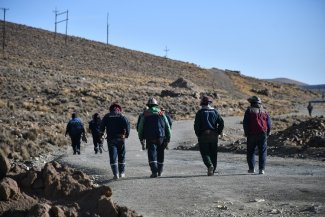
With many of the men having fled, gone missing or been killed, women are often the main breadwinners of the family. A Syrian woman embroidering in a clandestine workshop set up by a group of Syrian refugees close to the Turkish-Syrian border, in Turkey’s Hatay Province (northeast of Syria).
“I feel as if life has given me a second chance,” says Tajj, one of the countless civilians kidnapped during the course of the conflict in Syria, where abduction has become a money-making business as the war enters its final stages.
My abductors “held me in a one-square-metre room without even water to drink. I lost 25 kilos in two and a half months,” says 31-year-old Tajj, who requested his real name not be used. He was kidnapped in January 2018 by eight masked men at a checkpoint in the northern province of Idlib, the last rebel-held stronghold. He never found out who they were, but they knew all about him.
They knew he worked for a foreign NGO and that his father was the head of an ashira, a local tribe. First, they asked his family for a ransom of half a million dollars (around €450,000). Following lengthy negotiations and the sale of a portion of their lands, they eventually paid out US$75,000 (€67,000). Tajj says he knows of eight other similar cases. His kidnapping cost him his job and his career, as he was forced to flee to Turkey.
As the war enters its ninth year (and faces a new humanitarian crisis after renewed hostilities have threatened the fragile peace in Idlib since the end of April), ruthless armed factions, militias and civilians, now without ideological motive, do not think twice about kidnapping to make a living. Syria has become a territory overrun by warlords and bandits inspired by the self-styled Islamic State (IS) or a popular TV series about drug trafficking. With Syria’s scarce resources having been plundered, trading in lives is one of the few options left.
Poverty and ISIS create a breeding ground for criminal activity
The war has cost half a million lives and has displaced half of Syria’s 23 million inhabitants, 5.6 million of whom are registered as refugees. It is one of the worst humanitarian crises since the Second World War.
The economy of this small oil producing state is in tatters. The United Nations Economic and Social Commission for Western Asia (UNESCWA) has estimated the destruction of physical capital and its sectoral distribution at over US$388 billion (€348 billion), and the actual physical cost of destruction at close to US$120 billion (€108 billion), not including the loss of lives and the loss of skilled labour resulting from the deaths or displacements. The FAO has warned that the lack of employment is the country’s main economic challenge: many civilians, children included, are having to work for a pittance to put food on the table.
With many of the men having fled, gone missing or been killed, women are often the main breadwinners of the family. Sara, who has asked to remain anonymous, is one of them. She endured the siege of the Al Waer district, in Homs, doing whatever she could with all the strength she could muster, braving the shelling and sniper attacks, dodging the dead bodies and the explosions in the taxi that would drive her to the poultry factory where she worked every day in the centre of the city.
The 46-year old accountant and her sister, a civil servant, have managed to keep their family alive with their meagre earnings and an unshakeable will to carry on working, even under the bombings. Sara recalls how, at the height of the siege, when vegetables were still making their way into Homs, people started sowing the seeds on the balconies and in the courtyards of those who had fled and had left them the keys to their homes. Millions had lost their land and many had to turn to urban farming to survive.
During the freezing cold winter nights, in the midst of total blackouts, Sara and her relatives would collect snow in tanks for drinking and washing. “I am able to clean an entire house with this amount,” she says jokingly, cupping her hands together. “If anyone is leading a normal life in my country it’s because their relatives are sending them money from abroad.”
Her father and her cousins were also abducted by different criminal gangs, and one of her brothers was detained by the regime. Securing their release cost them an absolute fortune, running into the tens of thousands of dollars, and pushed her already impoverished family deeper into debt, explains Sara, who fled to Turkey in 2013. Although now working for an NGO in Istanbul, she says she has heard about eight other abduction cases. “Syria is in total chaos, there is no security.”
Syrian labour market
Data about the Syrian labour market is rare. According to UN reports from 2016 and data from the regime, unemployment went from 8.6 per cent in 2010 to 55 per cent in 2015, 2.1 million jobs have been lost, and inflation peaked at 90 per cent in 2013. An estimated 83 per cent of the population is living beneath the poverty line. Monthly wages are below US$200 (€180) and are not enough to buy anything. The country’s oil industry has shrunk from 0.5 per cent of the world’s total production in 2010 to less than 0.05 per cent in 2016, according to BP reports. Extreme poverty has provided a breeding ground for criminal activity.
“We don’t know who abducted them, they have no name. This is how it goes: both me and you have weapons. We band together to kidnap people and ask for ransom money,” explains Sara, whose relatives were captured between 2012 and 2015, when sectarian ideologies still provided a justification for such acts. “My father was abducted because they thought he was an Alawite (the ruling minority). The same happened to my cousin, although in his case they thought he was Sunni, then realised they were mistaken.” What they did know is that he had been a dentist and would therefore have some savings.
It is difficult to estimate how many Syrians have been kidnapped since the war broke out in Syria in 2011. Security firms and consultants contacted by Equal Times are aware of the threat, which is spreading across the country, they say, due to the lack of security and the corruption both within the ranks of the regime and the debilitated rival factions.
The fact that there are no foreigners to abduct (except for recently reported cases) has limited the scope of the phenomenon.
Since 2013, following the abductions of foreign journalists by IS and other groups, some of whom are sadly famous for the videos published of their gruesome executions, international media outlets and NGO’s have not been sending foreign nationals to Syria. Although the self-styled ‘Caliphate’ has been all but annihilated following years of intense shelling, the group has left behind a legacy of crime.
Capitalising on the conflict
“It could, of course, be said that IS have set a trend. But the abductees and the abductors are Syrians, not foreigners or Martians,” says 26 year-old Aref Alkrez, the founder of a consultancy and communication firm specialised in Syria. The war put an abrupt end to the aeronautical engineering studies that the young man from a modest background was paying for thanks to temping work. But he has managed to find ingenious ways of capitalising on the conflict. After joining the opposition, and thanks to the little English he knew, he saw his dream of working in journalism come true. When the first foreign reporters started arriving in Syria, in 2012, he became a fixer, a kind of local producer with contacts.
“My English was really poor. Back then, I would never have imagined there was such a job as a fixer. But at the end of the first day they paid me $US100 (€90) and told me what I was doing was actually a job. I really liked the idea,” explains Alkrez, whose accidental landing in the journalism trade is not unusual in conflict zones. He found himself presented with a whole host of new opportunities “that had previously only been open to people belonging to the regime”.
Hussein Akoush, aged 24, from Al Atarib, Aleppo, followed a similar path that led him to work with leading media companies. He is currently working as a researcher. He was in secondary school when the war broke out. He dreamt of studying to be a dentist while making a little money working in a fridge factory. After the conflict broke out, his family lost the land on which they used to produce wheat, cotton and potatoes that they would sell to the regime.
According to the FAO, two thirds of the 1.5 million hectares of irrigated farmland have been lost since 2011. The situation has deteriorated so much that subsistence farming has risen from 18 per cent of GDP in 2010 to 60 per cent.
Akoush and his friends resorted to all kinds of unexpected occupations: mobile hospital services, construction, money changing on the black market or computer repairs. He says that the most unusual of all the trades he found himself working in was journalism. “Because during the 60-year dictatorship, there had never been any freedom of the press in Syria.”
Alkrez fled to Turkey in 2014, after IS had launched its kidnapping campaign. “In 2013, abducting journalists and NGO workers and selling them on to IS became a business in which many people took part. Ninety-five per cent of the people I knew were struggling financially, and the fight to survive led some of them into unlawful activities, such as arms trafficking. But the worst was the kidnapping.” Alkrez says he personally knows of 15 such abduction cases – three of which resulted in killings. They all followed the same pattern: kidnapping, filming the torture scenes, sending the video to the family and asking for an astronomical ransom. The perpetrators could be from any faction or area: from government or opposition factions, from Shabiha or Hezbollah militias, and from zones controlled by Ankara or Damascus.
Alkrez now devotes his time and efforts to “creating happiness and beautiful memories” as part of his new business staging high-end events and parties in Istanbul (but registered in Spain), to which he wears eccentric hats and embroidered capes. “Creating happy memories is really important to me, because I spent years working in an emotionally-damaged war zone. I enjoy having a good time and seeing the people around me being happy. Why not invest in that?”









